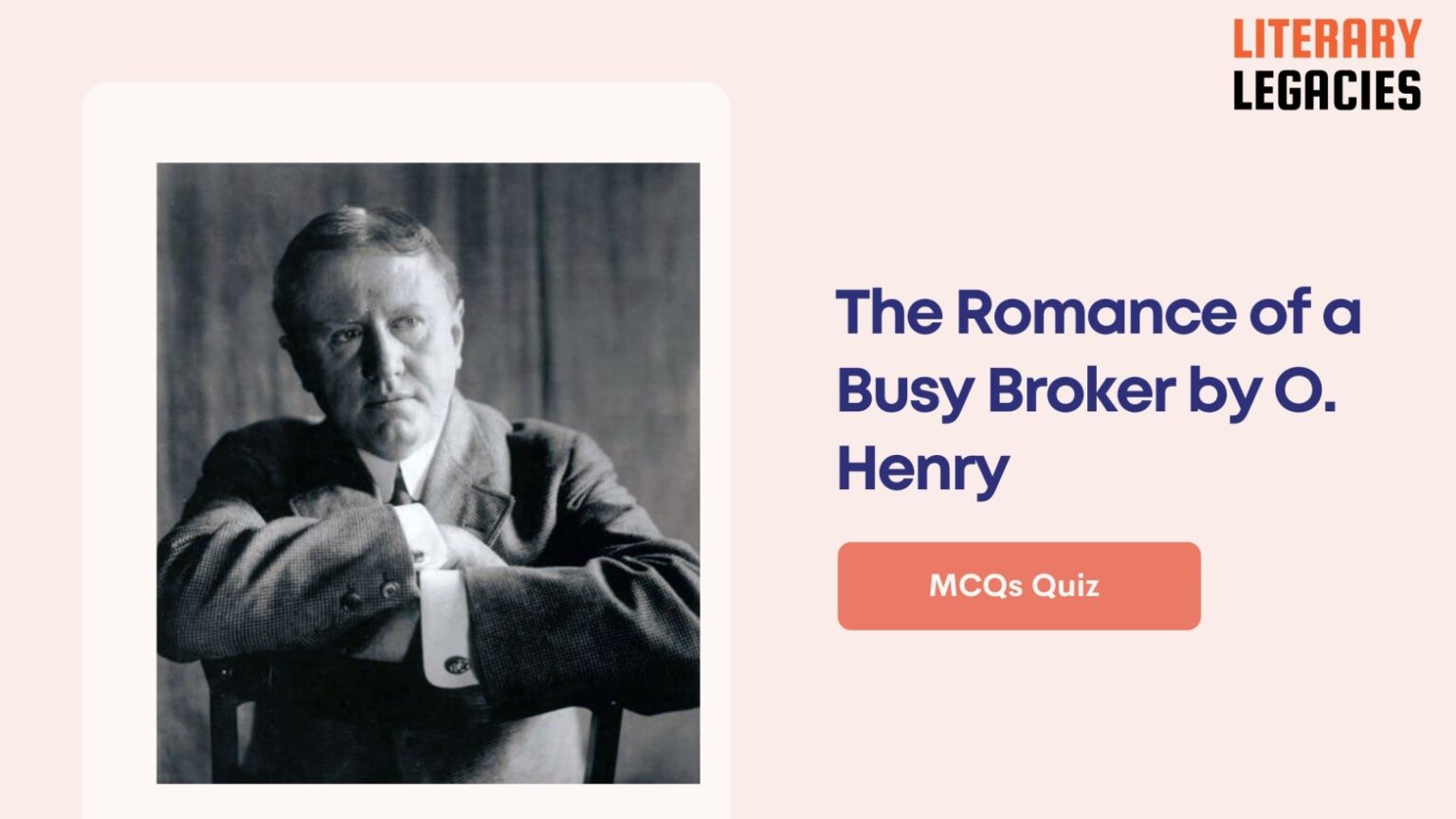1. What is the unusual time of day for Mr. Maxwell to arrive at the office?
A. 9:30 AM
B. 8:00 AM
C. 10:00 AM
D. Half past nine
Answer: Half past nine (D)
Mr. Maxwell’s arrival time is unusual for him.
2. What is unique about the young lady secretary’s dress?
A. It is loose and casual
B. It is brightly colored
C. It is gray and plain
D. It is ornate with jewels
Answer: It is gray and plain (C)
The young lady’s dress is simple yet fitting.
3. What is the occupant of Mr. Maxwell’s table doing while Mr. Maxwell is there?
A. Eating breakfast
B. Doing nothing, just sitting
C. Reading a newspaper
D. Typing on a machine
Answer: Typing on a machine (D)
The machine sitting at the table is a metaphor for Mr. Maxwell being busy.
4. What does Pitcher allow his face to show in the morning?
A. Anger and boredom
B. Interest and surprise
C. Happiness and excitement
D. Sadness and frustration
Answer: Interest and surprise (B)
Pitcher’s face usually shows no emotion.
5. Why does the young lady secretary wait instead of going straight to her workspace?
A. She is unsure of what to do
B. She is stretching her legs
C. She is greeting Pitcher
D. She is waiting for Mr. Maxwell’s instructions
Answer: She is unsure of what to do (A)
The young lady seems uncertain about what to do.
6. What is on the young lady secretary’s black hat?
A. A gold brooch
B. A silver pin
C. The gold-green wing of a bird
D. A red feather
Answer: The gold-green wing of a bird (C)
The hat is a distinctive part of the young lady’s appearance.
7. How does Mr. Maxwell treat the young lady secretary?
A. As a friend
B. As a superior
C. As a stranger
D. As a machine
Answer: As a machine (D)
Mr. Maxwell is more focused on his work than on interacting with the young lady.
8. What has Mr. Maxwell told Pitcher to do?
A. Promote her
B. Give her a raise
C. Fire the young lady secretary
D. Get another secretary
Answer: Get another secretary (D)
Mr. Maxwell wants to hire another secretary.
9. How does the young lady secretary respond to Mr. Maxwell’s plan?
A. She quits on the spot
B. She asks for a raise
C. She agrees to continue working until a replacement comes
D. She gets angry
Answer: She agrees to continue working until a replacement comes (C)
The young lady secretary is willing to continue working until a new secretary arrives.
10. What is the atmosphere around the young lady secretary this morning?
A. Tense and anxious
B. Cold and distant
C. Dreamy and happy
D. Bright and shiny
Answer: Dreamy and happy (C)
The young lady secretary seems radiant and cheerful this morning.
11. What was Harvey Maxwell’s job?
A. A secretary
B. A sailor
C. A broker
D. A dancer
Answer: A broker (C)
Harvey Maxwell was a busy New York broker.
12. What was the machine beside Harvey Maxwell’s table used for?
A. To send letters
B. To receive phone calls
C. To generate business news
D. To print newspapers
Answer: To generate business news (C)
The machine brought Harvey Maxwell business news as soon as it happened.
13. What did the young lady wear on her head?
A. No hat at all
B. A big hat covered with birds’ wings
C. A big hat with flowers
D. A small hat with feathers
Answer: A big hat covered with birds’ wings (B)
The young lady had golden hair and a big hat covered with birds’ wings.
14. Why did Harvey Maxwell’s hands never stop moving?
A. Because he was working like a fine, strong machine
B. Because he was eating
C. Because he was playing with his hair
D. Because he was nervous
Answer: Because he was working like a fine, strong machine (A)
Harvey Maxwell was working like a fine, strong machine, and his hands never had to stop moving.
15. What smell did Harvey Maxwell notice coming from his window?
A. The smell of food
B. The smell of paper
C. The smell of flowers
D. The smell of coffee
Answer: The smell of flowers (C)
Harvey Maxwell noticed a soft, sweet smell of flowers coming from his window.
16. What did Harvey Maxwell ask Miss Leslie to do?
A. To be his secretary
B. To bring him coffee
C. To marry him
D. To leave the office
Answer: To marry him (C)
Harvey Maxwell asked Miss Leslie to marry him.
17. How did Harvey Maxwell propose to Miss Leslie?
A. Through Pitcher
B. Romantically, with flowers and candles
C. Through a letter
D. Quickly, while he was busy working
Answer: Quickly, while he was busy working (D)
Harvey Maxwell proposed to Miss Leslie quickly, while he was busy working.
18. What was the reaction of Miss Leslie when Harvey Maxwell proposed to her?
A. She was angry and left the office
B. She was shocked and acted strangely
C. She was indifferent and did not respond
D. She was happy and accepted
Answer: She was shocked and acted strangely (B)
Miss Leslie acted strangely when Harvey Maxwell proposed to her.
19. What did Harvey Maxwell compare himself to?
A. A strong machine
B. A dancer
C. A sailor
D. A clock
Answer: A strong machine (A)
Harvey Maxwell was working like a fine, strong machine.
20. What happened to the business world during the dinner hour?
A. It remained the same
B. It grew wilder and faster
C. It stopped completely
D. It slowed down and calmed
Answer: It slowed down and calmed (D)
The business world grew quieter during the dinner hour.
21. What is the main occupation of Harvey Maxwell?
A. Stockbroker
B. Lawyer
C. Doctor
D. Teacher
Answer: Stockbroker (A)
Harvey Maxwell is the main character of the story.
22. What is unusual about Miss Leslie’s hat?
A. It’s very bright and colorful
B. It’s worn on the back of her head
C. It has a gold-green wing of a macaw bird
D. It’s a rare designer brand
Answer: It has a gold-green wing of a macaw bird (C)
Miss Leslie’s hat is a notable feature of her appearance.
23. Why does Miss Leslie ask Pitcher about the replacement stenographer?
A. She wants to know if Pitcher is looking for a new job
B. She wants to know if Maxwell is happy with her work
C. She wants to know if the agency is hiring
D. She wants to know if she’s being replaced
Answer: She wants to know if she’s being replaced (D)
Miss Leslie is concerned about her job security.
24. What is the atmosphere of the office during the day?
A. Relaxed and calm
B. Tense and argumentative
C. Busy and hectic
D. Quiet and empty
Answer: Busy and hectic (C)
The office is a hive of activity during the day.
25. What does Maxwell accuse Pitcher of doing when the lady from the stenographer’s agency arrives?
A. Stealing from the office
B. Slacking off
C. Being dishonest
D. Losing his mind
Answer: Losing his mind (D)
Maxwell is angry with Pitcher for looking for a replacement stenographer.
26. What is the significance of the lilac scent in the story?
A. It’s a sign of death
B. It’s a sign of prosperity
C. It’s a sign of romance
D. It’s a sign of danger
Answer: It’s a sign of romance (C)
The lilac scent is a subtle hint at Maxwell’s feelings for Miss Leslie.
27. What does Pitcher observe about Miss Leslie at the beginning of the story?
A. She’s being more distant
B. She’s being more talkative
C. She’s wearing a different dress
D. She’s acting differently today
Answer: She’s acting differently today (D)
Pitcher notices a change in Miss Leslie’s behavior.
28. What is the reason for Miss Leslie’s conversation with Pitcher?
A. She wants to gossip about Maxwell
B. She wants to ask for advice
C. She wants to know if Maxwell is looking for a replacement
D. She wants to talk about the weather
Answer: She wants to know if Maxwell is looking for a replacement (C)
Miss Leslie is concerned about her job security.
29. What does the story suggest about Miss Leslie’s appearance?
A. She’s heavily made-up
B. She’s beautiful in a discreet way
C. She’s glamorous and flashy
D. She’s plain and unattractive
Answer: She’s beautiful in a discreet way (B)
The story describes Miss Leslie as beautiful in a subtle way.
30. What does Maxwell’s behavior suggest about his feelings towards Miss Leslie?
A. He’s attracted to her
B. He’s indifferent to her
C. He’s afraid of her
D. He’s annoyed with her
Answer: He’s attracted to her (A)
Maxwell’s behavior towards Miss Leslie suggests he has romantic feelings for her.
31. What is the significance of Maxwell’s arrival at half-nine in the morning?
A. He is trying to impress Miss Leslie with his punctuality.
B. It suggests that he and Miss Leslie may have had a late night celebrating their nuptials.
C. He is trying to avoid Pitcher.
D. It is a typical arrival time for the broker.
Answer: It suggests that he and Miss Leslie may have had a late night celebrating their nuptials. (B)
The timing of Maxwell’s arrival at the office provides clues about his personal life.
32. Why does Miss Leslie ask Pitcher about the replacement stenographer?
A. She is trying to make small talk with Pitcher.
B. She is concerned about her job security.
C. She wants to know if Maxwell has found a new love interest.
D. She is trying to impress Pitcher with her professionalism.
Answer: She is concerned about her job security. (B)
Miss Leslie’s question to Pitcher reveals her concern about her role in the office.
33. What is the significance of Maxwell’s change in temperament when he arrives at the office?
A. He is anxious about a meeting with a client.
B. He is a newlywed and is feeling joyful.
C. He is tired from lack of sleep.
D. He is excited to start a new project.
Answer: He is a newlywed and is feeling joyful. (B)
The change in Maxwell’s demeanor is a hint at his recent marriage.
34. Why does Miss Leslie loiter outside Maxwell’s office?
A. She is trying to collect her thoughts before starting work.
B. She is waiting for Maxwell to finish a task.
C. She is trying to eavesdrop on Maxwell’s conversation.
D. She is adjusting to her new role as Mrs. Maxwell.
Answer: She is adjusting to her new role as Mrs. Maxwell. (D)
Miss Leslie’s actions outside the office reveal her new status as Mrs. Maxwell.
35. What is the significance of Maxwell showing up ‘in company with’ Miss Leslie?
A. They came to the office together as a newlywed couple.
B. It is a typical occurrence in the office.
C. It is a rare occasion for the two to arrive together.
D. They are trying to make a public display of their affection.
Answer: They came to the office together as a newlywed couple. (A)
The fact that Maxwell and Miss Leslie arrive together provides clues about their personal relationship.
36. What does Maxwell’s sudden abandonment of Miss Leslie reveal about his character?
A. He is trying to maintain a professional distance from his wife.
B. He is a romantic at heart.
C. He is insensitive to his wife’s feelings.
D. He is a busy and focused professional.
Answer: He is a busy and focused professional. (D)
Maxwell’s behavior towards Miss Leslie reveals his prioritization of work over personal life.
37. Why does the story need to be read twice to fully understand the plot?
A. The story has many plot twists and surprises.
B. The story’s significance is only revealed once the twist is known.
C. The story is too complex to understand on the first read.
D. The story requires prior knowledge of the characters and their relationships.
Answer: The story’s significance is only revealed once the twist is known. (B)
The story’s meaning is only fully understood once the reader knows the twist about Maxwell and Miss Leslie’s marriage.
38. What is the significance of Pitcher’s expressionless face in the story?
A. He is not involved in the office dynamics.
B. He is trying to hide his emotions from Maxwell.
C. He is a very serious and professional person.
D. He is surprised by Maxwell’s sudden change in demeanor.
Answer: He is surprised by Maxwell’s sudden change in demeanor. (D)
Pitcher’s expressionless face serves as a contrast to Maxwell’s changed behavior.
39. Why does the story focus on the morning scene in the office?
A. To introduce the characters and their relationships.
B. To create a sense of drama and tension.
C. To highlight the contrast between Maxwell’s old and new life.
D. To show the typical daily routine of the office.
Answer: To highlight the contrast between Maxwell’s old and new life. (C)
The morning scene serves as a backdrop to reveal the changes in Maxwell’s life after his marriage.
40. What is the overall tone of the story?
A. Humorous and lighthearted.
B. Romantic and sentimental.
C. Detached and observational.
D. Serious and dramatic.
Answer: Detached and observational. (C)
The story’s tone is observational, focusing on the details of the office scene.



